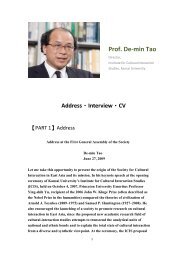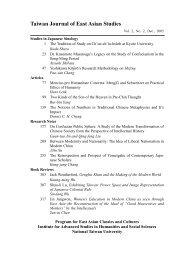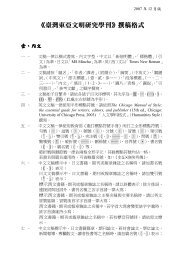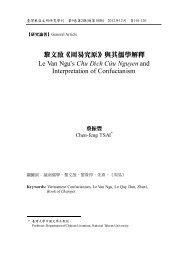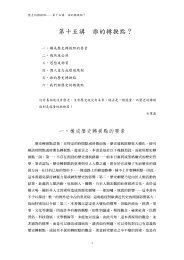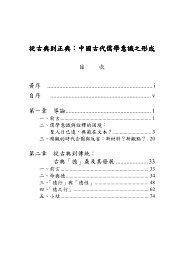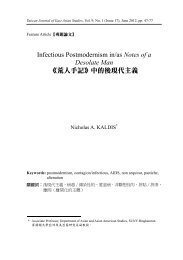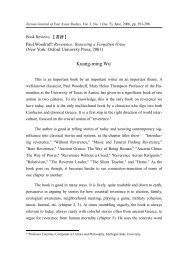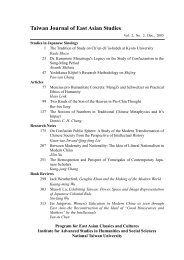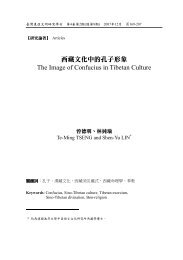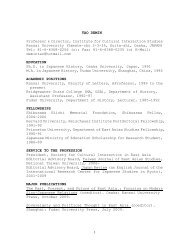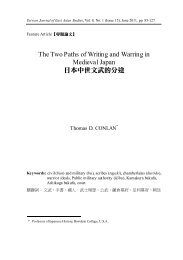臺灣東亞文明研究學刊 - 東亞經典與文化研究計畫 - 國立臺灣大學
臺灣東亞文明研究學刊 - 東亞經典與文化研究計畫 - 國立臺灣大學
臺灣東亞文明研究學刊 - 東亞經典與文化研究計畫 - 國立臺灣大學
You also want an ePaper? Increase the reach of your titles
YUMPU automatically turns print PDFs into web optimized ePapers that Google loves.
Jeng-Guo CHEN Scottish Discussions of Indian Effeminacy in the Eighteenth Century 159<br />
manners of the English in India was the thought that their vices would infect<br />
English society when those nabobs returned home. Thus, Henry Home (Lord<br />
Kames), a great patron for David Hume in Scotland and an advocate for polite<br />
culture, believed that trade was contributing to the marked decline in Britain's<br />
valiant spirit.<br />
Thus, by accumulating wealth, a manufacturing and commercial people<br />
become a tempting object for conquest; and by effeminacy become an easy<br />
conquest. The military spirit seems to be at a low ebb in Britain: will no<br />
phantom appear, even in a dream, to disturb our downy rest? 18<br />
Ferguson's apprehensions about the threat to the national spirit convinced<br />
neither Hume nor William Robertson (1723-94), a close friend of Ferguson and a<br />
famed historian devoted to the . Robertson questioned his friend's allegations about<br />
the superiority of Arabian national character. Robertson praised Muslims in general<br />
and the Mughal emperor Akbar (1542-1605) in particular for his encouragement of<br />
commerce. In a display of religious toleration characteristic of the age, Robertson<br />
praised Muslims for combining "commercial ideas and objects" with "devotion." 19<br />
As Dow had before him, however, Robertson contrasted the roughness of Muslims<br />
with the softness of Hindus: this was in the Hindus' favor since gentleness was<br />
considered congenial to commerce.<br />
Thanks to a temperate national character, Indian commerce, like India itself,<br />
was eternal, unchanging. Robertson stated that India, when first colonized by the<br />
Hindus, has been long a great commercial society. 20 When the Europeans revived<br />
18 Henry Home, Sketches of the History of Man, vol. 3 (1778; repr., Bristol: Thoemmes Press, 1993),<br />
p. 8.<br />
19 William Robertson, An Historical Disquisition Concerning the Knowledge which the Ancients had<br />
of India: and the Progress of Trade with that Country Prior to the Discovery of the Passage to it<br />
by the Cape of Good Hope (Bristol: Thoemmes, 1997), p. 187. To be sure, Robertson did criticize<br />
Islam as "illiberal fanaticism" (p. 235).<br />
20 Ibid., p. 236.<br />
xi



